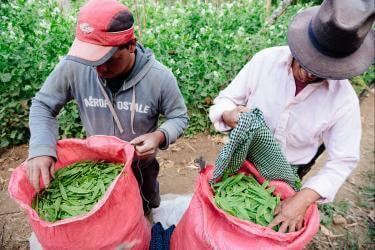Guatemalan agricultural exporters are calling on maritime shipping and airlines companies to help to improve the country's rural competitiveness and prevent migration to the US
Guatemala's agricultural sector remains one of the most resilient sectors in the country, despite the strong negative economic impact that the COVID-19 pandemic has brought to it. However, the pandemic, strong competition from other countries, climate challenges and ever increasing maritime and airfreight shipping costs are affecting the incomes of thousands of agricultural families. As a result, thousands of jobs are at risk and migration to the United States is the only solution for rural producers to obtain the income to support their families.
While the demand for agricultural products has increased (according to a recent market study on consumer sentiment, conducted by PMA, the consumption of fruits and vegetables as of June 2020 increased by 11% compared to March of this year), Guatemalan peas and vegetables companies were able to operate only on half of their capacity, which significantly increased all their costs, including production costs. These companies confronted many challenges, which forced them to leave the fields, pick much less products ready to be harvested, face a shortage of labor for the post-harvest handling and shipping of their products already paid by international customers. As a result, all these challenges have led to the sale of their products already at lower prices compared to prices before the start of the pandemic.
Mr. Andrés Bickford, Manager of AGEXPORT’s Agriculture Sector, commented rural agricultural workers in Guatemala are really feeling the economic impact of the very high maritime and airfreight shipping rates. “We understand that all industries took a hit with the pandemic, which is why we are calling on maritime shipping lines, especially Seaboard and Crowley, and on airlines, especially cargo airlines, to start negotiations with Guatemalan agriculture industries to find the best way to support the rural competitiveness of Guatemala and be able to keep supplying the US market with top-quality agriculture products like mangoes, pineapples, berries, limes, roasted coffees and vegetables,” he said.
AGEXPORT want to negotiate with maritime shipping lines a much better container rate, according Mr. Bickford, door-to-door, from the packaging plants in Guatemala to their customers' distribution centers in the United States, and for all agricultural products. Faster shipping rate would have a strong economic impact on the entire value chain, especially on the income of small producers and on the competitiveness of their products. “In addition, it is a win-win situation as well for the shipping lines, as they guarantee themselves consistent volume from long-lasting clients of fresh and frozen agriculture products while also cooperating to stop migration influxes from Guatemalan rural areas to the United States, which is the first thing that happens when formal jobs are lost in our country,” he concluded.
The Guatemalan Exporters Association (AGEXPORT) is a private non-profit entity, established in 1982; that represents, promotes and develops exports of Guatemalan companies. It provides high-level assistance services to the exporters, serving the business community at-large in international trade activities and investments, whether in Guatemala or abroad.
More information about the Association on its website.





